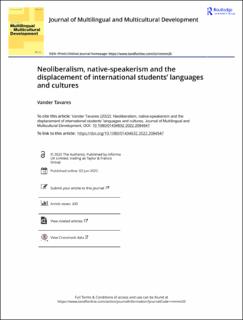| dc.contributor.author | Tavares, Vander Junior | |
| dc.date.accessioned | 2022-08-16T10:54:02Z | |
| dc.date.available | 2022-08-16T10:54:02Z | |
| dc.date.created | 2022-08-08T14:21:59Z | |
| dc.date.issued | 2022 | |
| dc.identifier.citation | Journal of Multilingual and Multicultural Development (JMMD). 2022, 1-14. | en_US |
| dc.identifier.issn | 0143-4632 | |
| dc.identifier.uri | https://hdl.handle.net/11250/3012071 | |
| dc.description | © 2022 The Author(s). Published by Informa UK Limited, trading as Taylor & Francis Group. This is an Open Access article distributed under the terms of the Creative Commons Attribution-NonCommercial-NoDerivatives License (http://creativecommons.org/licenses/by-nc-nd/4.0/), which permits non-commercial re-use, distribution, and reproduction in any medium, provided the original work is properly cited, and is not altered, transformed, or built upon in any way. | en_US |
| dc.description.abstract | With the number of international students growing rapidly within (international) higher education, more attention has been focused on the need to consider international students’ experiences, particularly those from the global south, from more critical, ethical and qualitative perspectives. This paper examines how the lived experiences of three multilingual international students at a Canadian university were impacted by ideologies stemming from neoliberalism and native-speakerism within higher education. Through in-depth interviews with each student, the findings point to complex ways in which such ideologies gradually worked to displace the students’ languages and cultures through processes of othering and inferiorisation. More specifically, the combined sociocultural and material impact of neoliberalism and native-speakerism resulted in the students appearing to reject participation in and affiliation to their cultural groups, repositioning their languages as deterrents to the development of their English language proficiencies, and adopting behaviours that could linguistically and socially approximate them to an imagined native speaker of ‘standard’ English, including attending speech therapy. The conclusion critically discusses the importance of reform in higher education with respect to language, diversity and social justice. | en_US |
| dc.language.iso | eng | en_US |
| dc.rights | Attribution-NonCommercial-NoDerivatives 4.0 Internasjonal | * |
| dc.rights.uri | http://creativecommons.org/licenses/by-nc-nd/4.0/deed.no | * |
| dc.subject | neoliberalism | en_US |
| dc.subject | nativespeakerism | en_US |
| dc.subject | international students | en_US |
| dc.subject | higher education | en_US |
| dc.subject | monolingualism | en_US |
| dc.subject | multilingualism | en_US |
| dc.title | Neoliberalism, native-speakerism and the displacement of international students’ languages and cultures | en_US |
| dc.type | Peer reviewed | en_US |
| dc.type | Journal article | en_US |
| dc.description.version | publishedVersion | en_US |
| dc.subject.nsi | VDP::Samfunnsvitenskap: 200::Pedagogiske fag: 280 | en_US |
| dc.source.pagenumber | 1-14 | en_US |
| dc.source.journal | Journal of Multilingual and Multicultural Development (JMMD) | en_US |
| dc.identifier.doi | https://doi.org/10.1080/01434632.2022.2084547 | |
| dc.identifier.cristin | 2041767 | |
| cristin.ispublished | true | |
| cristin.fulltext | original | |
| cristin.qualitycode | 1 | |

